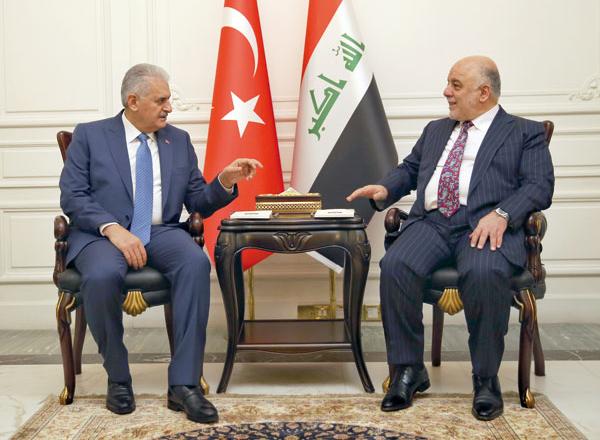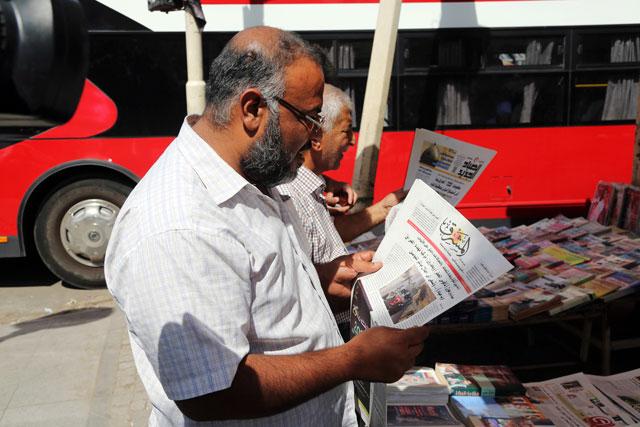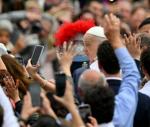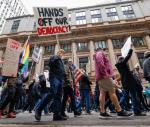You are here
Turkish PM visits Iraq amid spat over unauthorised troops
By AP - Jan 07,2017 - Last updated at Jan 07,2017

Iraq’s Prime Minister Haider Al Abadi (right) and Turkish Prime Minister Binali Yildirim speak during a meeting in Baghdad, Iraq, on Saturday (AP photo)
BAGHDAD — Turkish Prime Minister Binali Yildirim commenced a two-day visit to Iraq Saturday, the first since the two governments quarreled over the presence of unauthorised Turkish troops in northern Iraq, straining relations between the two neighbours fighting the Daesh terror group.
Meanwhile, Iraqi government troops made fresh progress in their push against Daesh inside the northern city of Mosul, dislodging militants from new areas and for the first time reaching the nearest point to Tigris river that divides the city since the operation began in mid-October.
The presence of some 500 Turkish troops in the Bashiqa region, northeast of the Daesh-held city of Mosul, has stirred tension with Baghdad since late last year. Iraq has demanded their withdrawal, saying they are there without permission and are in “blatant violation” of Iraqi sovereignty. Turkey says the troops were invited by local Iraqi authorities and has ignored the calls.
Shortly after Yildirim arrival, the Turkish Ambassador to Baghdad, Faruk Kaymakci, said on his Twitter accounts that “We hope that his visit will open a new chapter in Turkey-Iraq relations.”
But emerging from an hours-long meeting in Baghdad’s fortified Green Zone area, both sides seemed still far from resolving that issue.
Iraqi Prime Minster Hiader Al Abadi said in a joint press conference the Turkish delegation “stressed that this issue will be resolved in a proper way within the [coming] short period.”
For his part, Yildirim said the presence of the Turkish troops “wasn’t born out of pleasure but rather out of need”.
“Iraq’s sovereignty is very important for us, we will not allow or be involved in any attempt or move to hurt its sovereignty,” Yildirim added.
Both sides also said they had discussed the fight against Daesh, and the Kurdish Turkish separatist group known as the PKK, which has used Iraqi territory to launch attacks inside Turkey and target water supplies to the Tigris and Euphrates rivers.
The issue has led to a war of words between the two nations’ leaders as Iraqi government troops launched a massive military operation to recapture Mosul on October 17. Ankara has insisted that its forces should take part in retaking the city, but Baghdad has refused.
The issue of the Turkish forces in Bashiqa grew into a rare and bitter public feud last year between Turkish President Recep Tayyip Erdogan and Iraqi Prime Minister Haider Al Abadi.
At one point, Erdogan gave a speech telling Al Abadi to “know his place,” and adding, “you are not at my level, you are not my equivalent, you are not of the same quality as me”.
Abadi responded by mocking Erdogan’s use of a video messaging app during Turkey’s failed coup last year.
An Iraqi court later issued an arrest warrant against the former governor of Ninevah province, of which Mosul is the capital, Atheel Al Nujaifi, accusing him of facilitating the entry of the Turkish forces. The troops have trained Sunni fighters loyal to Al Nujaifi and Kurdish forces loyal to Kurdish leader Masoud Barzani — who both have sought greater power away from the Shiite-led central government in Baghdad.
Turkey has also deepened its involvement in the war in neighbouring Syria, where its forces and allied Syrian opposition fighters are battling both Daesh extremists and US-backed Syrian Kurdish forces. Last month, Russia, which backs the Syrian government, and Turkey, a strong supporter of Syria’s moderate opposition, brokered the current shaky cease-fire, which came into effect on December 30.
Also Saturday, Iraqi troops pushed deeper into eastern Mosul, entering four neighbourhoods, according to the operation’s commander Lt. Gen. Abdul Amir Rasheed Yar Allah. He said in a statement that the troops had “liberated” the neighbourhoods of Rifaq, Atibaa 1st and Atibaa 2nd, as well as Ghufran along the Tigris River, but didn’t elaborate on whether pockets of resistance still remained.
Yar Allah also announced the capture of the Salah and Shafaa hospitals in the Wahda neighbourhood as well as a 186-building residential complex in the northern Hadbaa neighbourhood.
Iraq’s second-largest city, Mosul fell to Daesh in the summer of 2014 as the militants swept over much of the country’s north and central areas. If successful, the retaking of the city would be the biggest blow yet to Daesh. Mosul is the largest remaining city in the self-declared Daesh “caliphate” spanning Iraq and Syria.
Elsewhere, Turkish fighter jets struck 11 Kurdish militant targets around Qandil in northern Iraq Friday, according to Turkey’s military.
F-16s and F-4s pounded rebel positions, shelters and ammunition depots belonging to the PKK, or Kurdistan Workers’ Party, the military said in a written statement.
The PKK, which has been fighting an insurgency since 1984, resumed attacks in Turkey after a fragile peace process with the government collapsed in 2015. The group is considered a terror organisation by Turkey and its western allies.
Related Articles
BAGHDAD — Two Iraqi soldiers were killed in rare clashes Sunday with the Kurdistan Workers Party (PKK) in the north of the country wher
ISTANBUL — Turkey’s deputy prime minister said on Wednesday a military build-up on the border with Iraq was a precaution, not a threat, and
BAGHDAD — Iraq has requested an emergency UN Security Council session over the presence of Turkish troops in northern Iraq, a foreign minist















